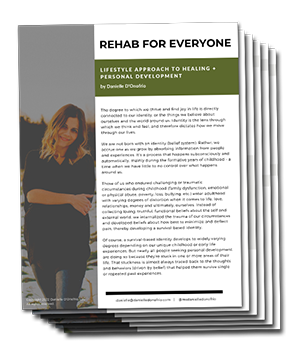People pleaser sounds like an admirable disposition on the surface. However, it’s a dysfunctional tendency that attracts unhealthy relationships and drains us of valuable energy.
People pleasing is a hard habit to shake. The belief that we must do and be things for other people to be liked, loved and secure stems from a deep inner wound. This wound separates us from our innate worthiness, leaving us desperate to fill the void. So, we work tirelessly to earn our self-worth from the approval and praise of others.
But the approval and praise that result from our people pleaser tendencies typically only come from those who detect our need for it. It’s one of the main reasons we end up in relationships with self-centered or abusive personalities.
People pleasers are off-putting to healthy, functional, authentically happy people. The relationships that blossom with people pleasing as a characteristic interaction are not the relationships you’re looking for. So, if your intent is to heal and improve the quality of your life, you must flip the script ASAP.
I’ve improved my relationships 100-fold since healing my people pleaser thought and behavior patterns. It didn’t happen overnight. But there was one powerful rule – or boundary – I set for myself that nipped it in the bud for good.
I’m going to tell you about the boundary and how to immediately apply it to your life. But first, let’s dig into the thought patterns, behaviors and after-effects of people pleasing.

Here’s how I ultimately figured out that my people pleasing was a dysfunctional pattern attracting the wrong people into my life.
The people pleaser in me used to show up as a burst of excitement at the idea of doing something for someone. Whether it was giving away a dress I never had a chance to wear; offering to babysit for free to make a relative’s life easier; or giving gifts and trinkets for no reason at all – the thought of doing something for someone, or to impress someone, gave me this overwhelming feeling of…hope. This hopeful feeling came with a subtle, autopilot-like visualization of the appreciation and closeness I’d receive as a result.
Yikes, describing it that way sounds creepy, right? That’s because it kind of is.
People pleasing is manipulation due to low self-worth cloaked in “do gooder/helper” mentality.
There’s literally no other way around it.
And I don’t say this to make us recovering people pleasers feel badly. Rather, I want to increase awareness of the fact that it’s an utterly useless tactic. People pleasing is a dysfunctional behavior that perpetuates the cycle of dysfunctional relationships.
Of course, at the time I had no awareness of the dysfunctional nature of my people pleaser tendency. I was just going with “what felt right and good” and that was “doing nice things for people.”
The first red flag was realizing it never felt right and good afterward.
People pleasing always left me feeling disappointed, exhausted, and even a bit resentful.
My whole life, I’ve heard friends and family casually throw around, “Oh, I’m just a people-pleaser.” Usually, they meant this proclamation as a compliment to themselves, or to explain why they’re so busy and stressed, doing things for everyone all the time. As I’ve become aware of what people pleasing is all about, I now cringe at this admission.

So, let’s first break down why people pleaser tendencies are a dysfunctional pattern.
Then, we’ll get into a super simple way to stop doing it, even when the pull to please is so dang hard.
First, when the initial thought arises to do something for someone, or give something away, we must be super honest with ourselves about why we want to do this thing.
There was always a part of me that thought it just felt good to do something nice for someone else. And that’s the confusing part of all this.
It is indeed nice to do things for people – BUT not when there’s (A) no existing socio/interpersonal “contract” or request for such an exchange and/or (B) there’s an expectation of something in return, even if it’s acknowledgement and appreciation, or some enhancement to the relationship status.
Let’s break A and B down a bit more because this stuff’s important.
(A) What do I mean by a socio/interpersonal contract or request?
By “socio/interpersonal contract” I mean there is an existing tradition or agreement for gift-giving or exchange of energy. In other words, you are not coming up with the idea to give something away yourself – culture or society is. Think birthdays, Christmas, weddings, charity events…
Sounds weird, I know. But stick with me here.
If you do or give something to someone outside of these standard social or cultural “contracts”, you are essentially establishing a new contract without informing the other person involved. “I’ll do this for you and I expect you to be happy and appreciative (and like me/make me feel good about myself) in return”. You can see how this is neither balanced nor fair.
Now, you could counter me here and say, “well, isn’t it just nice to do things for people spontaneously or as a surprise? Just because it feels good to make someone else feel good?”
And I’d say, “eh, not really, because then the giving is still about you (not them)”. And if I’m honest, I really don’t like when people give me things or do things for me outside of the traditional contexts. Rarely do I feel authentically grateful, because it wasn’t something I identified a need for in my life – so it ends up being extra stuff or extra interactions I wasn’t planning for that I now need to fit into my time or physical space. And on top of that, I’m seemingly forced to step into a polite demeaner to express gratitude for something I didn’t ask for.
It feels controlling…because it is.
I’d much rather spend time with a person, experience something with them, have hours of good conversation. Don’t bring me cookies. Ask me if I want to spend the afternoon baking cookies with you so we can build and nurture our relationship. If you’d rather not spend the afternoon baking cookies with me, don’t give me anything at all. I won’t be manipulated with gifts. Catch my drift?
I don’t want stuff. And I have a feeling I’m not alone in this.
Anyway, on to (B). And this is where we really need to get honest with ourselves.
If you have a thought to do something or give something to someone, what do you expect in return?
Another way to ask the questions is, what’s in it for me? If the answer is TRULY nothing, you may be in safe territory ( a healthy, mutually giving relationships). But it’s such a gray area. At the very minimum you are probably doing it because you hope it will make you feel good, valued, appreciated or more secure in your relationship with the other person. If you’re early in your journey, the reality of that is probably quite subtle and confusing. It may even come off as an offensive assumption.
But you’re here, so I know you’re open to change and healing. So, let’s keep going.

Let’s get to the simple boundary that will heal your people pleaser habit for good.
In my head, the boundary sounds like this:
I don’t give my time or things away anymore. Period.
What that short statement means in reality is:
I don’t give away my time, money or possessions outside of special occasions where it’s socially or culturally expected to do so. (e.g., birthday and Christmas gifts, bringing a dish or bottle of wine to a dinner party, donating my clothes to charity…). The only exceptions outside these circumstances are: if something is requested of me and I WANT to fulfill that request; if someone is in need and WANTS my help (trying to help someone who doesn’t want to be helped is a big no-no; more on that later).
I urge you to keep your interpretation and application of this boundary very cut and dry.
Ultimately, what you’ll be doing with this boundary is allowing people to like you for YOU, instead of what you do for them. Those who benefitted from your people pleasing will most likely become confused, frustrated, or uninterested. Let those people go and make room for authentic relationships. Trust the process. It’s so worth it.
At the beginning, the idea of not giving or doing for others (to make them like you) will feel like a loss of control.
Releasing your people pleaser habits will force you to sit with the wound you were compensating for. You will indeed need to face your feelings of unworthiness or unlikability; your fear of being alone or abandoned. And as uncomfortable as that may be, it’s exactly what you want. You need those feelings and fears to surface so you can address them…and heal. This is where it’s helpful to work with a therapist or coach. You’ll want support in processing what you feel and why, so you can resolve it.
Note that the urge to people please will continue to show up. It still does for me. But with this new boundary, you’ll be empowering yourself with a method for recognizing the urge. Recognition is awareness, which gives us the opportunity to do better and finally move forward in the healing process.
Now, there is a bit of nuance here, and I suspect this part will quell the naysayers.
This boundary is not selfish or self-centered. Rather, it’s an acknowledgement of the fact that some people – usually those with wounding and trauma from childhood – have a tendency for adding a dysfunctional spin on the exchange of energy between people. People pleasing is one-sided. Healthy relationships are multi-dimensional and absolutely have a giving element to them. When giving and helping occur in a healthy, functional relationship, the mutual exchange of energy – the back and forth – is baked in without expectation. You give because YOU CARE and reciprocation is a proven aspect of the relationship.
If you’re early in the journey and still struggle with people-pleasing, don’t worry about the nuance yet. Just set the boundary for yourself. With discipline and consistency, you’ll develop healthier relationships and the perceived need to people please will dissolve.
Boundaries is the first of 4 core categories in my REHAB FOR EVERYONE Lifestyle Approach to Healing & Personal Development.
Learn more about the REHAB FOR EVERYONE methodology and download the FREE eBook here.
Thanks for stopping by!
Pictures taken at Turtle Creek Preserve in Essex, CT, along the Connecticut River.

